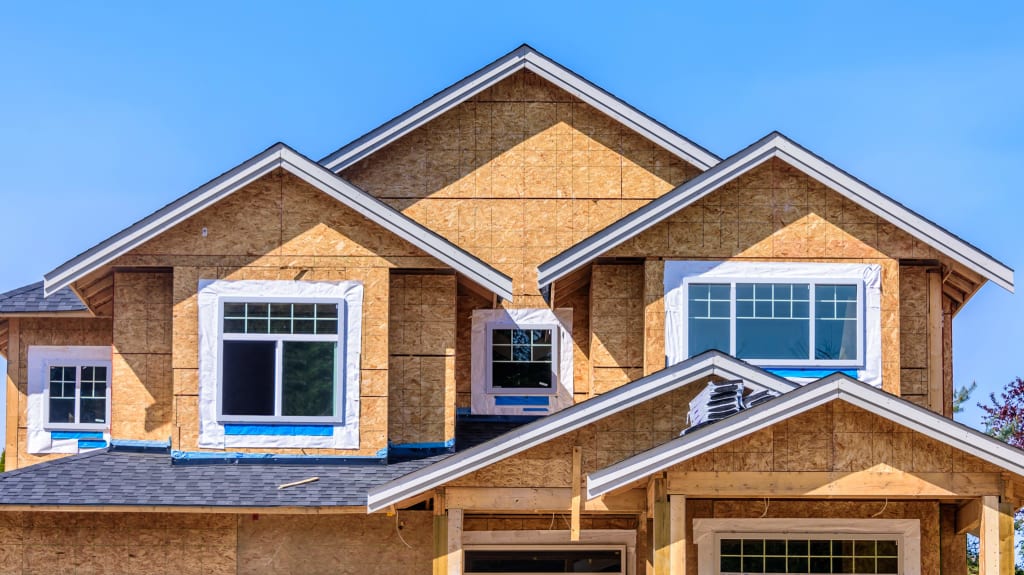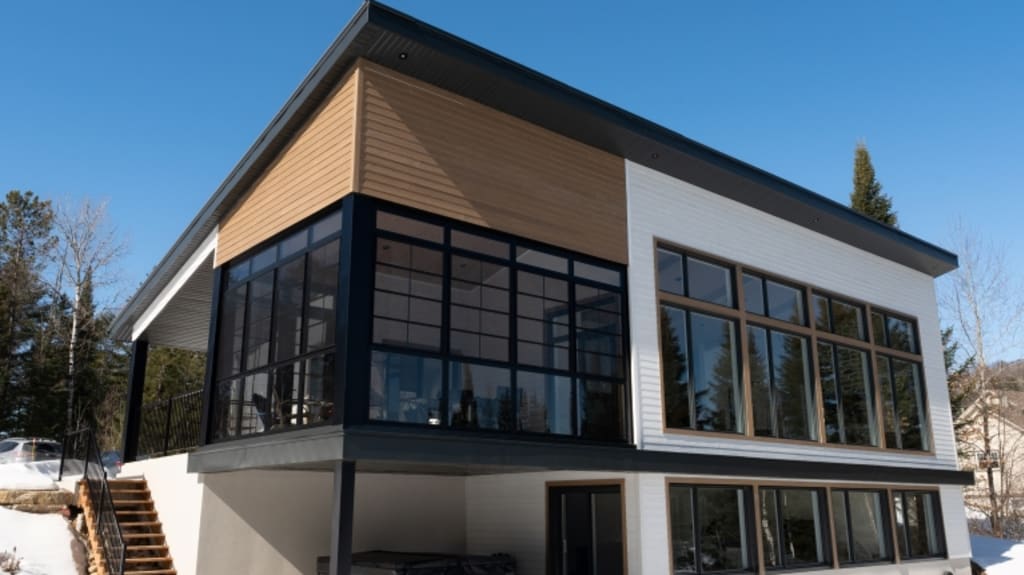Purchasing new property is always exciting but it’s also a decision that needs a lot of thought. Should you buy a new home from a home building company, a lot for a custom home build or an older place potentially requiring renovations? There are so many options to choose from. Let’s go over the pros and cons of each so you can make an informed decision.

Types of builds
Before making the decision to build or buy, let’s go over all the options for building a home.
House plans Some companies like Drummond House Plans sell premade floor and house plans. They’re often cheaper than paying an architect to draft plans from scratch.
Prefab home If you’re looking for a green building option, modular or prefab homes are great. Companies offer a selection of home designs to choose from and build each house in a factory before transporting it to the work site for completion.
Hiring a contractor If you have already had a lot, you can get a house designed by an architect and hire a contractor to build it. Self-build If you have the right licences, you can attempt to build your house yourself. Though, you’ll need an architect to draft plans that comply with the National Building Code. Although going the DIY route can be appealing, it does come with a slew of responsibilities. With unexpected errors, paperwork delays and a mountain of tiny decisions, the self-build process can quickly become overwhelming if you’re not prepared. In addition to the actual physical labour, you’ll also have to spend hours overseeing every tiny detail from meticulously going over each expense to managing your timeline and applying for the right licences on time.
Buying from a promoter You can buy a lot and a house in a new development. Once the build is complete, you then take possession of the house.
Things to consider when building a house
Location and land
Finding lots for sale in or near metropolitan areas is becoming increasingly difficult. In most cases, new developments are further and further away from major cities like Toronto and Montréal due to a lack of space. So, if you plan on moving to a home on an empty new lot, get ready for a long commute!
New development considerations
If you plan on buying a property that’s part of a new development, you’ll need to keep in mind that all services–stores, public transportation, sanitation services, etc.–will take a while to be built and established. For example, the forest behind your new home might become a public park or new elementary school, so keep an eye on the development plans!
Though, there are some upsides to buying a property that’s part of a development. For example, if you’re one of the first buyers, you get dibs on which lot you’d like. That said, you also have no idea who your neighbours will be until the day they move in.
Find the right professional
Finding the right professional to help build your home should be handled with as much care and attention to detail as you would use when shopping for a pre-built house. A qualified, reliable contractor will be able to provide clearly written contracts, insurance, warranties and a written estimate. They’ll also have a timeline outlining the scope of the project as well as labour costs. RenoAssistance’s Team Lead, Residential Services and Training Maria Santamaria notes that a GCR (garantie de construction résidentielle or guarantee plan for new residential buildings) licence along with multiple references and proof of contracts for similar homes are also a must when searching for the right contractor.
However, as Santamaria points out, nothing compares to the RenoAssistance verification process when a contractor is financially vetted. This verification decreases the risks associated with:
Taking on too many projects and not being able to deliver all on time, within budget and quality standards.
Being able to pay subcontractors and suppliers, putting the client at risk of leans.
Taking on projects that are too big, putting the client at risk.
Permits and regulations
Before you break ground on your new construction project, it’s essential to have the correct permits and ensure your project complies with local regulations. In Ontario, building without a permit can result in a fine of “$50,000 for a first offence and up to $100,000 for subsequent offences,” according to the Government of Ontario’s website. Maria Santamaria emphasizes the importance of confirming with your city before building.
“The city will tell you what your limitations are in terms of building, but an engineer and architect will assess what is possible structurally. In Quebec, the RBQ licence (Régie du bâtiment du Québec, a.k.a. Quebec Building Authority) should always be verified to ensure that contractors and owner-builders are allowed to build.”
Design and layout
The biggest advantage to building your own home is that you get to design its layout. But before you go crazy with an ultra-custom floor plan, be sure to consider how those layout and design choices will affect your resale value. Even if you have a clear vision in mind, it never hurts to consult a professional before committing to anything.
Timeline
On average, building a new home in Ontario will take anywhere from a couple of months to a whole year to complete. When dealing with custom home builds or high-end designs, you can expect that timeline to span past the one-year mark. It’s important to keep your timeline in mind and make sure you and your family have a secure place to stay while construction is underway. Like any renovation project, the timeline is always subject to change when unexpected hurdles pop up.

Factors to consider when buying an existing home
In many ways, buying a pre-built home is far easier than building a new one from the ground up. However, there are still a handful of important factors to consider before you make a big purchase. A few examples of these factors include:
What is the current state of the real estate market–is now the best time to buy?
What will property taxes cost you in the town you choose?
Are there any maintenance costs you will encounter immediately after purchasing?
Additionally, you’ll want to think about the points listed below when choosing to buy instead of building.
Location
If you’ve heard it once, you’ve heard it a thousand times: Location! Location! Location! When buying a home, location is everything, so be sure to ask your real estate agent or the current homeowner what the area is like. For example, if you’ve got a family with a few kids, then a neighbourhood filled with retirees or empty nesters likely won’t be the right fit. You also won’t have to wait for public services or facilities to be built as they’re already there! However, if you have a specific locality in mind, you’ll only be able to choose from what’s on the market and won’t necessarily have much choice in terms of where homes are located.
Condition of the property
When dealing with the condition of your potential new property, it’s always best to opt for a home inspection. Home inspectors have a trained eye and can spot issues with the property and building that you might not see. A home inspector will look at everything from the home’s foundation to the condition of major systems on the property (i.e., plumbing and electrical). On a more aesthetic note, be sure to look at the landscaping–will you need to do a ton of work to get your yard ready?
Energy efficiency
Finding a home with energy-efficient qualities will not only save you money on monthly utility costs, it’s also better for the environment. It’s easy to incorporate all the energy-efficient elements you desire when building your own home. However, it’s not always that simple when you’re buying a pre-existing home. Keep your eyes peeled for Energy Star certified homes and appliances.
Neighbourhood amenities
To ensure life at your new home is as easygoing as possible, it’s important to check out the local amenities. For example, if you have a dog, you’ll want to buy a house located near a dog park or walking path. Other amenities such as grocery stores, banks and entertainment should also be within walking or driving distance.
Future potential
Before you’re ready to offer a down payment, consider a property’s future potential. If the home is energy efficient, in a good location, in upstanding condition and near–quality amenities, then you can rest easy knowing your home value is likely to increase over the years.
Building vs. buying a house: Pros and cons
Buying pros | Buying cons | Building pros | Building cons |
The property will have mature trees and landscaping is already complete. | Less control over tree placement and landscaping decisions. | Near complete control over tree placement and landscaping decisions. | Potential for high landscaping costs. |
Easier to find a home close to city amenities. | May require more upfront maintenance, especially for older homes. | Less up front maintenance. | Likely to be further away from the city. |
Public services pre-established. | Must deal with a highly competitive real estate market. | Little to no competition. | May need to wait for public services such as garbage pick-up to be established. |
Faster process, and easier to acquire. | May end up with an older home without energy-efficient materials, resulting in higher monthly costs. | Ability to easily incorporate energy-efficient systems and materials to keep monthly costs low. | A more involved process that takes longer. |
Is it cheaper to build or buy a home?
The truth about what is cheaper, buying or building a house, largely depends on your specific situation. That said, the upfront cost of building tends to run higher than the cost of buying a pre-existing home. However, if your pre-existing home needs dire repairs and maintenance updates, then the cost can quickly skyrocket. To give you more insight on what is cheaper, buying or building a house, look at these price breakdowns below.
Cost of building a house
Two-storey house 30 x 35 (3 bedrooms upstairs) with a single garage: $465,000 to $530,000
Ground floor: | 800 sq. ft. |
Upper floor: | 1,000 sq. ft. |
Garage: | 240 sq. ft. |
Basement: | unfinished |
Two-storey house 40 x 30 (4 bedrooms upstairs) with a single garage: $505,000 to $574,000
Ground floor: | 900 sq. ft. |
Upper floor: | 1,100 sq. ft. |
Garage: | 240 sq. ft. |
Basement: | unfinished |
Two-storey house 48 x 35 (5 bedrooms upstairs) with a double garage: $660,000 to $785,000
Ground floor: | 1,100 sq. ft. |
Upper floor: | 1,400 sq. ft. |
Double garage: | 480 sq. ft. |
Basement: | unfinished |
The biggest advantage of building a home from the ground up is customization–you decide how it looks. However, the beautiful decor seen on home improvement shows often comes with a hefty price tag. Many prospective homeowners don’t realize how quickly costs can rise when building their dream house. So, be sure to plan out a budget and stick to it. Just don’t forget a contingency fund for unforeseen circumstances.
Building a house yourself will save you money on labour costs (~30%), but keep in mind that you need to be licensed if you’re going this route. Ideally, you should be very experienced in construction and renovation as well as have great time management and planning skills. You’ll also need to hire skilled tradespeople and subcontractors for portions of the work you aren’t qualified to do. Managing a project of this size is a lot of work, so consider investing in a general contractor. They’ll handle all of this for you, and you’ll be able to invest your time elsewhere.
In terms of affordability, it’s often best to purchase a pre-existing home–just be sure to establish your needs and budget before you start looking at properties. Before you seal the deal, hire an inspector to check out the home. You’ll want to know if there are major issues with the roof, windows, HVAC system, or even the structural integrity of the home. Similarly, you may consider changing the layout of the home or making a room fairly bigger.
Cost of buying a house
In Toronto, homebuyers should plan to spend around $1,300,000 for a fully detached single-family home. The median price for a condo runs around $780,000.
In Quebec, the median cost of buying a single-family house hovers between $400,000 and $440,000. For a condo, that price drops to roughly $375,000–$390,000. And finally, for a multiplex building, you can expect to pay upwards of $550,000.
What’s riskier: Buying or building?

Whether you’re going with cookie-cutter or custom, you’ll need to do a background check on any building company or contractor you plan to work with. It can be a long, tedious process, but it’ll save you time, money, and potential hardship. Verify their licences, permits, and legal records, and ask to speak to past clients and to see past projects. Be sure to ask potential contractors questions when meeting with them. In Ontario, new homes constructed by a Home Construction Regulatory Authority (HCRA)-licenced builder or vendor are eligible for the New Home Warranty. Self-builds are not eligible for this warranty.
Purchasing an older home comes with risks as well, namely, that you inherit all of the home’s problems after signing on the dotted line. To protect yourself, get an inspection done by a licensed professional. They’ll make note of any issues within the home so that you can make an informed decision.
Does my decision affect my financing options?
Financing a new build or a self-build is different from getting a mortgage to purchase a new home. When getting a home built, you’ll need to work with your financial institution throughout the entire building process. The bank will need to approve your future home’s plans from the get-go. Plus, you’ll need to provide them with a cost estimate and a schedule for the work being done, quotes from suppliers and subcontractors, your building permit, and much more.
If they approve your application, you’ll receive funds as your home is being built and passes routine inspections. With each disbursement, the financial institution will hold on to a percentage (~15%) of the funds until the work is complete.
The mortgage will be in the promoting company’s name while the work is being done if you decide to buy from a promoter. They’ll be responsible for the capital and interest during the build and you’ll need to pay them back. Though, if you already own the land and are hiring a professional home builder, you’ll be responsible for the finances while the work is being completed.
Acquiring a mortgage for a pre-existing home is much simpler! Once the requested amount is approved, you’ll be able to shop around for a house that fits your budget and put an offer on the ones that interest you. When your offer is accepted, the bank will provide you with the mortgage, and you’ll be able to purchase the home.
Building vs. buying a home: Which option is right for you?
It depends on your needs and how involved you want to be in the process. If you have a specific vision and don’t mind living outside of the city centre, then building a new house might work best for you. However, if you have time constraints, want to live in a specific area, or don’t mind renovating an existing space to meet your needs, then buying a house might be a better option for you. No matter what you choose, be sure to hire licenced professionals that can help you create the home of your dreams.
Find a professional to build your house
There are advantages to both building and buying a home but for those who want more control over aspects like floor plans and energy-efficient materials–building is the way to go. When taking on a building project of this size, it’s vital to find the right professionals that will make your home build a success.
At RenoAssistance, our team of Renovation Advisors are here to help you source reliable, qualified contractors. Each contractor we recommend goes through a verification process so you can rest easy knowing they have up-to-date licensing, completed background checks and more. So, what are you waiting for? Contact our Renovation Advisors today to get started on your dream home.





